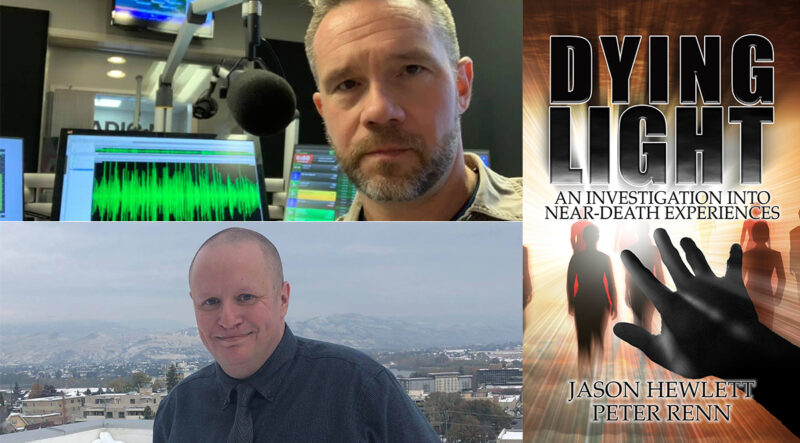Near-death experiences can change one’s perspective on living.
It was that thought that made former journalist Jason Hewlett adjust his subject matter for his third book.
The Kamloops, British Columbia co-author of Dying Light: An Investigation into Near-Death Experiences was inspired by the experiences of New York-based paranormal investigator Angela Artuso in his second book.
Hewlett and paranormal colleague Peter Renn touched on her experiences in their second book I Want to Believe: An Investigators’ Archive, but it was her brush with death after her car was hit head-on by a truck.
While she was lying in the passenger seat, she noticed a man in black seated beside her, and when she asked the man told her it was not her time.
“She got onto this little segue that was her near-death experience, which is in the book; the Man in Black chapter,” Hewlett said, during a July Zoom call. “I remember, I grabbed my phone and called Peter and said, ‘We need to write a book about near-death experiences because this is just mind-blowing.’”
Renn agreed and shared his brush with death for the book, which also features interviews with other near-death experiencers.
Renn’s experience stems from a life-saving liver transplant he had in 2018. Most of his story was shared in the duo’s second book, I Want to Believe: An Investigators’ Archive, but they revisit it through the lens of near-death instead of paranormal investigation.
His ordeal began in October 2017, but it wasn’t until he was rushed to the hospital after a bout with liver poisoning that finally felled him.
“He had flatlined,” the 49-year-old said. “His experience was very much waking up, the tunnel of light, a figure, passageway to go through, wanting to go through it and the figure stopping him saying, ‘No it’s not your time yet. You have these two little kids and your wife’.”
Renn suspected it was his grandfather, whom he had never met. After the experience, he woke up without the help of an electrocardiogram.
Although Hewlett has not had a near-death experience, he’s had two moments where he’s wondered what happens when we die. Hewlett’s father died of a heart attack when he was 19. His father was in good health but had succumbed to an undiagnosed heart condition.
“I didn’t come to terms with it until 2018, and that was after a career as a crime reporter, which put me front-and-centre with many horrible things,” he said. “Writing this book put a lot of (death) into a clearer focus.”
Another instance had Hewlett hearing a voice in his head offering alternative lives he could have. It was a cold November evening, and his wife and son were sleeping. He stepped outside to get some air and when he returned inside, he was still cold.
His wife woke up and worked to keep him calm during his episode. The experience, akin to Nora’s choices in Matt Haig’s The Midnight Library led him on his path to investigating the paranormal.
“At the time, it scared me, but after writing this book and hearing people with similar opportunities at the end of their near-death experience, I just feel in some weird way, I started this path of taking the paranormal more seriously,” he said. “There’s this universal sign … you’ve danced around with it your entire life, go on.”
Dying Light was written between October 2021 and May 2022 and was launched on June 14 through Beyond the Fray Publishing. Hewlett said the response has been positive.
“There’s been lots of interest from people wanting to talk about it,” Hewlett said. “People that don’t want to read the other stuff, they’re interested in it. ‘Aw, we don’t care about ghosts, but this is something that interests us because it touches on reincarnation and multiverse stuff’.”
Dying Light: An Investigation into Near-Death Experiences is available for purchase on Amazon, along with I Want to Believe: One Man’s Journey into the Paranormal and I Want to Believe: An Investigators’ Archive.

